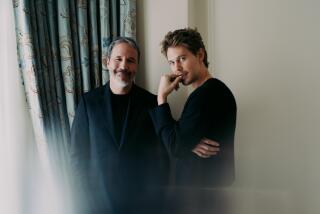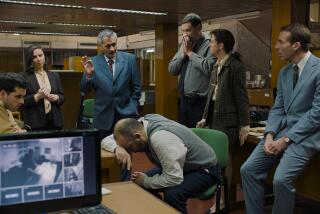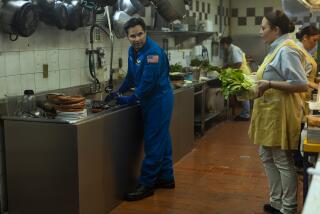Review: In ‘Aristotle and Dante Discover the Secrets of the Universe,’ a tender closeness unfolds
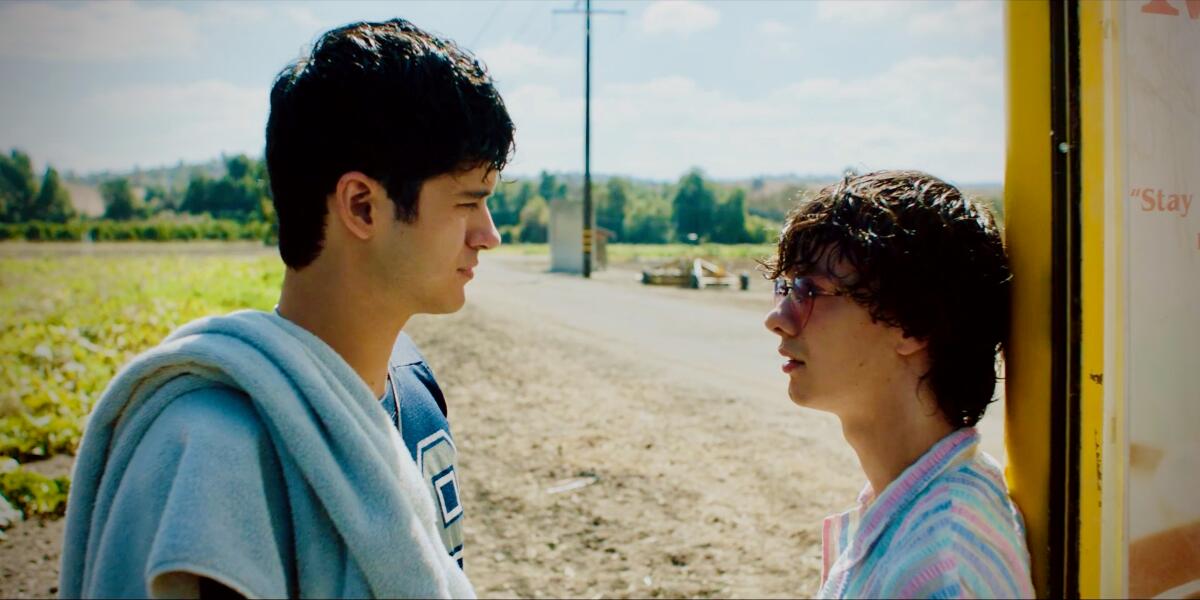
“Something more” is that well-worn phrase applied to close friendships when latent attraction seems on the cusp of manifesting. For teenagers, it’s even more loaded, because life in general can feel like it hasn’t happened yet, even if what’s supposed to occur seems undefined, potentially scary and maybe magical.
It’s that sense of adolescent life as a perpetual state of what could be that gives writer-director Aitch Alberto’s adaptation of Benjamin Alire Sáenz’s treasured YA novel “Aristotle and Dante Discover the Secrets of the Universe” its sweet, simmering dramatic tension, as the lonely, bonded Mexican American teenage boys of Sáenz’s late-’80s-set story navigate a closeness neither knows how to fully process beyond the joy inherent in a world-expanding connection.
But at times, what’s unspoken is also a source of abiding empathy in this finely modulated heartlight of a film — the way a gesture, a look or a well-timed “I love you” may be enough to also communicate “I see you.” Brooding El Paso high-schooler Aristotle (Max Pelayo), laid up in the hospital after an accident in which he saves the life of his new best bud Dante (Reese Gonzales), earns a moment like that with his beloved tia (Marlene Forte), whose charged smile suggests an awareness that doesn’t need to be articulated yet, but that she knows is worth nurturing. It isn’t the movie’s first wonderfully warm and layered exchange, and it won’t be its last.
When we meet Ari, loneliness is his badge of honor, from the masculine codes of cruelty he bristles at in other boys to the aggravating pall he feels at home from a silent, working-class dad (Eugenio Derbez) and doting but grim-faced mom (Veronica Falcón), neither willing to talk to Ari about his older brother being in prison. Ari knows what he doesn’t want to be more than who he is. So at first, scrawny, eccentric Dante is just the nice, colorfully attired classmate who teaches Ari how to swim at the community pool, in between laughs, popsicles and teasing conversations about how Mexican they feel.
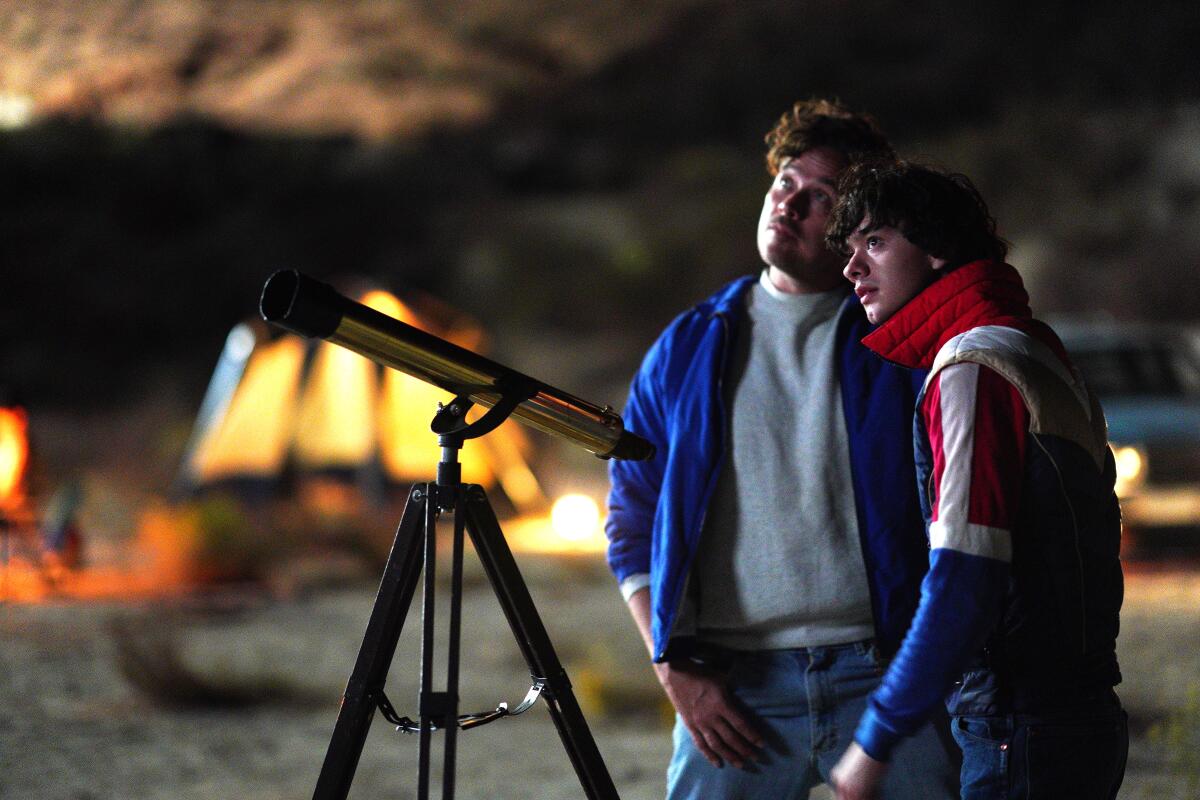
But soon a friendship of opposites develops, with Ari’s outsider shell cracking in the glow of Dante’s eagerness to share with him his love of art, music, literature and, on their camping trips with his well-to-do, approachable and protective parents (Kevin Alejandro and Eva Longoria), the night sky’s glistening wonder. When Dante moves away for a year, a distance develops. But also a chance for both to ask themselves who they are, and what the friendship might look like when Dante returns.
To know the direction this is all headed in — first made explicit in Dante’s increasingly honest letters about his sexuality — doesn’t make “Aristotle and Dante” predictable, however. Nor is it some issues-driven Afterschool Special about identity that prioritizes platitudes over human interaction. With her feature debut, Alberto keenly understands that any story of self-discovery is as much a constellation as it is a journey, and that’s how her adaptation plays, as a mature accumulation of the tender, the uneasy and the clarifying. With Akis Konstantakopoulos’ cinematography occasionally graced by the desert climate’s softly popping color, the movie breathes as it moves. (And sometimes that movement is to a lively mix of ‘80s-era radio hits and Isabella Summers’ solid score.)
The performances, too, are their own arrangement of hues, from Pelayo’s kind eyes (which belie Aristotle’s performative surliness) to the gentle bravery that Gonzales gives Dante’s more upfront emotions. These appealing actors do happy/comfortable as well as they do awkward/confused, and they’re well-supported by the portraits of parental love offered up by Falcón (whose internalized worry is especially powerful), Derbez, Alejandro and Longoria.
Though this fictional love story is not untouched by the kind of violence that continues to threaten LGBTQI visibility everywhere, “Aristotle and Dante” is distinguished by its atmosphere of compassion in which expression thrives. In a lovely way, it feels like this coming-of-age movie’s own “something more.”
'Aristotle and Dante Discover the Secrets of the Universe'
Rating: PG-13, for some strong violence, strong language, sexual material, teen drug/alcohol use, thematic elements and smoking
Running time: 1 hour, 36 minutes
Playing: In general release
More to Read
Only good movies
Get the Indie Focus newsletter, Mark Olsen's weekly guide to the world of cinema.
You may occasionally receive promotional content from the Los Angeles Times.
